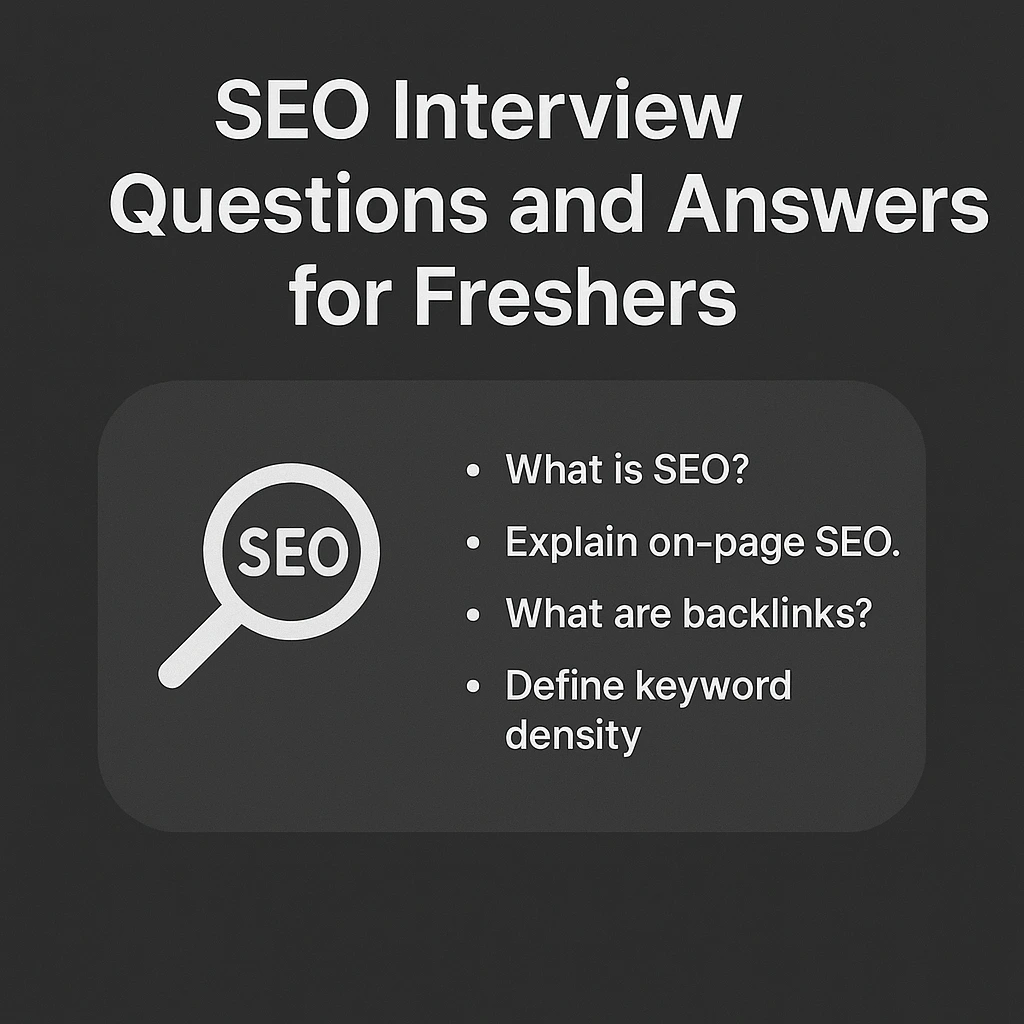SEO (Search Engine Optimization) is one of the most in-demand digital marketing skills today. For freshers looking seo interview questions to build a career in SEO, preparing for interviews can be challenging without proper guidance.
In this detailed guide, we’ll cover the most frequently asked SEO interview questions, their best answers, 10 practical examples, and detailed FAQs.
🔍 Why SEO Interviews Matter for Freshers
Freshers often find SEO exciting but don’t always understand how deeply technical and strategic it can be. Interviewers look for both basic SEO knowledge and practical understanding of tools and techniques.
✅ Top 20 SEO Interview Questions and Answers for Freshers
Below are SEO interview questions and answers tailored for entry-level candidates.
1. What is SEO?
- SEO stands for Search Engine Optimization. It’s the process of optimizing a website to improve its visibility on search engines like Google for relevant queries.
2. What are the types of SEO?
On-Page SEO: Optimization of content, meta tags, headings, images, internal linking.
Off-Page SEO: Backlink building, social signals, guest posting.
Technical SEO: Site speed, mobile-friendliness, crawlability, schema markup.
3. What is a backlink?
- A backlink is a hyperlink from another website pointing to your site. It’s a key off-page SEO factor and helps build authority.
4. What is a keyword?
- A keyword is a word or phrase that users type into search engines to find information. SEO involves optimizing content around target keywords.
5. What is the difference between dofollow and nofollow links?
Dofollow: Passes link juice and helps with rankings.
Nofollow: Instructs search seo interview questions engines not to follow the link (no ranking benefit).
6. What are meta title and meta description?
Meta Title: The clickable title in search engine results.
Meta Description: The short summary under the title, used to entice users to click.
7. What is a sitemap?
- A sitemap is a file that lists all pages on your website to help search engines seo interview questions crawl your site more efficiently.
8. What is robots.txt?
- It’s a file that tells search engine crawlers which parts of your website they can or cannot access.
9. What is Google Search Console?
- A free tool by Google that helps monitor your website’s presence in search results and shows errors, indexing issues, and performance data.
10. What is a canonical tag?
- A canonical tag tells search engines which version of a page is the original, to prevent duplicate content issues.
11. What is page speed, and why is it important?
- Page speed is the time a web page takes seo interview questions to load. Faster websites offer better user experience and rank higher.
12. What is mobile-first indexing?
- It means Google predominantly uses the mobile seo interview questions version of content for indexing and ranking.
13. What is the difference between organic and paid results?
- Organic results appear due to SEO. Paid results (ads) are placed by advertisers using Google Ads.
14. What are long-tail keywords?
- These are longer and more specific keyword phrases, often easier to rank for and more targeted.
15. What is bounce rate?
- Bounce rate is the percentage of users who leave a website after viewing only one page.
16. What is domain authority (DA)?
- A score (0-100) that predicts how likely a website is to rank on search engines, developed by Moz.
17. What is black hat SEO?
- Unethical SEO practices like keyword stuffing, cloaking, or buying links. These can result in penalties.
18. What is white hat SEO?
- Ethical optimization techniques that follow Google’s guidelines, such as quality content seo interview questions and relevant link-building.
19. What is schema markup?
- A type of structured data code added to websites to help search engines understand content better (used for rich snippets).
20. What SEO tools should freshers know?
Google Search Console
Google Analytics
Ahrefs
SEMrush
Ubersuggest
Yoast SEO (WordPress)
Rank Math SEO
✨ 10 Real-Life SEO Examples for Interview Discussion
| Example | Explanation |
|---|---|
| 1. Keyword Optimization | Used focus keywords in headings, meta tags, and content |
| 2. Internal Linking | Linked blog posts to each other for better crawlability |
| 3. Image SEO | Added alt text and compressed images |
| 4. Sitemap Setup | Created XML sitemap and submitted to GSC |
| 5. Robots.txt Blocking | Blocked unnecessary admin pages from crawling |
| 6. Bounce Rate Improvement | Added call-to-action and table of contents |
| 7. Mobile Optimization | Used responsive design for mobile UX |
| 8. Backlink Building | Wrote guest blogs to earn links |
| 9. Speed Optimization | Minified CSS, JS and used lazy loading |
| 10. Fixed Broken Links | Removed 404 pages and redirected properly |
❓ Detailed FAQs on SEO Interview Preparation
Q1: How should I prepare for my first SEO interview?
- Start with SEO fundamentals: On-page, Off-page, and Technical SEO. Learn how Google ranks pages, and understand tools like Google Search Console.
Q2: Should I learn SEO tools before the interview?
- Yes. Being familiar with tools like Search Console, Analytics, Ubersuggest, or SEMrush is a big plus, even for freshers.
Q3: Do I need coding knowledge for SEO?
- Not necessarily. But basic understanding of HTML (meta tags, headings, alt text) is helpful.
Q4: What kind of SEO projects can I show as a fresher?
- Create a sample blog or portfolio site. Optimize content using SEO principles. Track results using free tools.
Q5: What are common mistakes freshers make during SEO interviews?
Overusing jargon they don’t understand
- Forgetting technical SEO basics
Not giving real-world examples
Lack of research on the company’s website SEO
Q6: How important is content in SEO?
- Very important. Quality, unique, and keyword-rich content is the foundation of good SEO. Content relevance and value are key.
Q7: How long does it take to see SEO results?
- It can take 3 to 6 months for noticeable ranking changes, depending on competition, niche, and effort.
Q8: What is Google’s E-E-A-T in SEO?
- It stands for Experience, Expertise, Authoritativeness, and Trustworthiness. Google uses these signals to assess content quality.
Q9: Is SEO still a good career in 2025?
- Absolutely. SEO is evolving with AI and voice search, but demand for skilled SEO professionals is growing.
Q10: Where can I practice SEO skills as a fresher?
Start your own blog (e.g., with WordPress)
- Help local businesses optimize their sites
Do internships
Take online SEO certifications
📌 Final Tips for SEO Interview Success.
Study real examples from websites you admire.
Practice explaining SEO in simple terms—this shows true understanding.
Focus on learning, not memorizing answers.
Stay updated with Google’s latest updates and trends.
Read blogs like Moz, Search Engine Journal, and Fresh Blog for insights.
📣 Conclusion
- Cracking an SEO interview as a fresher is not about perfection — it’s about showing curiosity, foundational understanding, and practical examples. Use this guide to prepare confidently and stand out in your next SEO job interview.



